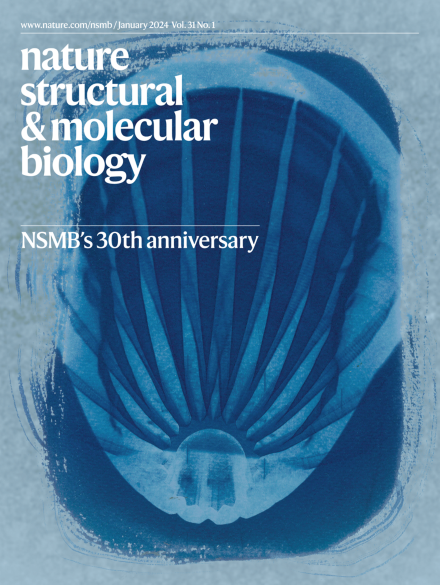膜内GlpG蛋白水解的时间分辨结构快照
IF 16.8
1区 生物学
引用次数: 3
摘要
细胞膜内的蛋白质切割触发了各种病理生理信号通路,但催化机制尚不清楚。我们在双细胞膜中解决了大肠杆菌菱形蛋白酶的十个结构,经过时间分辨步骤,包括跨膜底物和醛抑制剂上的整个蛋白水解反应。广泛的门打开伴随着底物而不是抑制剂的结合,表明底物和抑制剂走不同的途径到达活性位点。催化出乎意料地开始于细胞外环的运动,并通过活性位点残基的局部贡献引导其通过随后的催化步骤。我们甚至捕捉到了难以捉摸的四面体中间体,它未被切割,但共价连接到催化丝氨酸上,底物被迫在丝氨酸附近急剧弯曲。这种出乎意料的稳定中间体表明,菱形催化使用了前所未有的反应配位,可能涉及对肽键的机械应力,并可能被抑制剂选择性靶向。时间分辨晶体学捕捉了大肠杆菌菱形蛋白酶GlpG在不同催化步骤中的情况,揭示了底物如何到达活性位点和反应中间体。本文章由计算机程序翻译,如有差异,请以英文原文为准。
Time-resolved structural snapshot of proteolysis by GlpG inside the membrane
Protein cleavage inside the cell membrane triggers various pathophysiological signaling pathways, but the mechanism of catalysis is poorly understood. We solved ten structures of the Escherichia coli rhomboid protease in a bicelle membrane undergoing time-resolved steps that encompass the entire proteolytic reaction on a transmembrane substrate and an aldehyde inhibitor. Extensive gate opening accompanied substrate, but not inhibitor, binding, revealing that substrates and inhibitors take different paths to the active site. Catalysis unexpectedly commenced with, and was guided through subsequent catalytic steps by, motions of an extracellular loop, with local contributions from active site residues. We even captured the elusive tetrahedral intermediate that is uncleaved but covalently attached to the catalytic serine, about which the substrate was forced to bend dramatically. This unexpectedly stable intermediate indicates rhomboid catalysis uses an unprecedented reaction coordinate that may involve mechanically stressing the peptide bond, and could be selectively targeted by inhibitors. Time-resolved crystallography captures Escherichia coli rhomboid protease GlpG in different steps of catalysis, revealing how substrate reaches the active site and reaction intermediates.
求助全文
通过发布文献求助,成功后即可免费获取论文全文。
去求助
来源期刊

Nature Structural &Molecular Biology
生物-生化与分子生物学
自引率
1.80%
发文量
160
期刊介绍:
Nature Structural & Molecular Biology is a monthly journal that focuses on the functional and mechanistic understanding of how molecular components in a biological process work together. It serves as an integrated forum for structural and molecular studies. The journal places a strong emphasis on the functional and mechanistic understanding of how molecular components in a biological process work together. Some specific areas of interest include the structure and function of proteins, nucleic acids, and other macromolecules, DNA replication, repair and recombination, transcription, regulation of transcription and translation, protein folding, processing and degradation, signal transduction, and intracellular signaling.
 求助内容:
求助内容: 应助结果提醒方式:
应助结果提醒方式:


